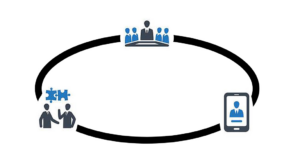Let’s review five of them:
1. Do one thing at a time.
Our brain is not capable of real multitasking like computers, instead, it keeps switching between tasks. This has significant negative effect on both quality and speed. In any outstanding performance you can observe that it cannot happen without full concentration (see sports or demanding cognitive activities).
2. Don’t be available all the time.
Or else you will be constantly interrupted. It takes time to recapture your line of thought each time you have to stop the work you are immersed in. The same is true for meetings. If people keep answering their phone calls, the duration of the meeting will dramatically increase. It is far more productive for all participants concerned, if we call people back afterwards. As a positive side effect, some of the problems will be solved by the time we get to them.
3. Don’t start your work day with checking email.
Instead, complete an item from the top of your priority list. Then you can review your inbox. Otherwise you can easily realise at lunchtime that half of the day passed but you didn’t achieve anything that you planned for the day, or what would be really important. Naturally, if you need some information to start your day (e.g.: shift supervisors who have to know what happened during the preceding shift), then you should check that specific e-mail first.
4. Turn off all your notification beeps.
On your phone and computer as well. This is also a killing form of interruption. Most people do not need to check incoming messages every 5 minutes. Considering the type of job you have, you can define a reasonable frequency of checking your messages on all kinds of digital tools. For many people, every 2 hours, or even once or twice a day would be sufficient. Especially if you are in a management role.
5. Don’t fill up all your day with meetings.
If there is a strong pressure, block out some parts of the day for yourself for specific activities. It is very dangerous to use the full workday for meetings because your own work will have to be done anyway. Therefore, you will be doing those in the evenings or weekends, instead of refuelling yourself or spending quality time with your family.
In my view, effective people can find time for all the things that are important for them, in each critical domain of life. All the habits above can be great help. However, they require significant effort, especially for people who are used to operating in the contrary way. Maybe you have heard all of these suggestions, so there is nothing new for you in this blogpost. Ok. But honestly, have they really become your habits?
Act2Manage Application
An interactive, gamification-based, practice-oriented leadership development application that provides immediate help and enables follow-up to the most common dilemmas.






